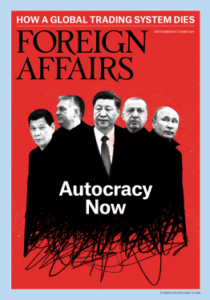 In countries where a free press was just beginning to emerge, a cocktail of rising authoritarianism, audience cannibalization by social media, and financial weakness has thrown it into reverse. Independent journalism is viable in some places, but not overall. Everywhere, the same question about the future of news crops up: How can democratic societies get the journalism they need in order to function? Jacob Weisberg asks in Foreign Affairs.
In countries where a free press was just beginning to emerge, a cocktail of rising authoritarianism, audience cannibalization by social media, and financial weakness has thrown it into reverse. Independent journalism is viable in some places, but not overall. Everywhere, the same question about the future of news crops up: How can democratic societies get the journalism they need in order to function? Jacob Weisberg asks in Foreign Affairs.
On the plus side, he notes, populists’ “noxious verbal assaults on news organizations have had the perverse effect of making audiences more willing to pay for journalism, even as those comments have contributed to greater peril for journalists facing less constrained autocrats elsewhere,” he writes in a review of three recent books on democracy and media:
It’s far too soon to say that the economic crisis of journalism has passed, let alone the crisis of truth. There still exists no replicable business model that works for local news, which has diminished the accountability of state and metropolitan government. What do seem to be working are a variety of nonprofit and hybrid models that fill specific gaps in coverage, including ProPublica (investigative reporting), the Marshall Project (criminal justice), and The Texas Tribune (state government and politics). What the most innovative journalistic organizations seem to have in common is some form of subsidy combined with an ability to think like for-profit businesses even if they really are not.
The rapid proliferation of censorship and surveillance technology around the world is threatening human rights, the NED’s Center for International Media Assistance adds. These technologies are no longer limited to countries who have the resources and technical capabilities to build them from scratch. Authoritarian governments across the globe are acquiring state of the art repression technology at an alarming rate. These technologies are then used to target journalists and human rights defenders, stifle free speech, and undermine democracy.
 Authored by Open Technology Fund Information Controls Fellow Valentin Weber, a new research report to be released at the event tracks the export of Chinese and Russian censorship and surveillance technology around the world, providing fresh insight into the importance of telecommunications infrastructure to modern authoritarianism.
Authored by Open Technology Fund Information Controls Fellow Valentin Weber, a new research report to be released at the event tracks the export of Chinese and Russian censorship and surveillance technology around the world, providing fresh insight into the importance of telecommunications infrastructure to modern authoritarianism.
This report adds to a growing body of research that demonstrates how widespread this technology has become and that the sources range from Western companies to those closely affiliated with the Chinese and Russian governments. The panel will explore the alarming rate with which this sophisticated technology has been employed to silence dissent, the widespread harms this proliferation has caused, and what can be done to counter it.
Welcome and Opening Remarks:

.
Daniel O’Maley, Deputy Editor and Digital Policy Specialist, Center for International Media Assistance
Speakers:
Natalia Arno, President, Free Russia Foundation
Ron Deibert, Director, The Citizen Lab
David Kaye, U.N. Special Rapporteur for Freedom of Expression
Valentin Weber, University of Oxford and OTF Information Controls Fellow
Moderator: Laura Cunningham, Principal Director, Open Technology Fund
Tuesday, September 17, 10:00-11:30am EDT
Light refreshments served at 10:00am
National Endowment for Democracy
1025 F Street NW, Suite 800
Washington, DC 20004







